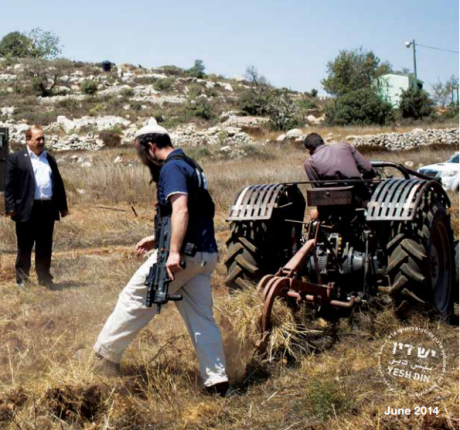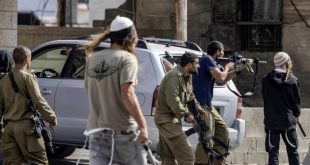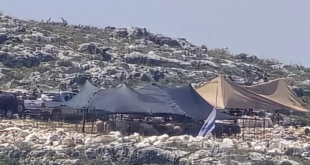Today Yesh Din is releasing the report “The Lawless Zone” on the transfer of policing and security powers to the Civilian Security Coordinators (CSCs) in the settlements and outposts. This report presents an analysis of the institution of the CSCs as an inherent aspect of the biased and chaotic state of Israeli law enforcement in the occupied Palestinian territories. The report demonstrates how the institution of civilian security coordinators undermines the rule of law in the West Bank to the point of devoiding it of all meaning, thereby constituting another layer in Israel’s violation of the duty imposed upon it to protect the Palestinian residents of the West Bank.
The civilian security coordinators and civilian guarding squads that operate in Israeli West Bank settlements are quasi-military forces composed of civilian residents of the settlements and outposts in the area. According to the army, their job is to defend the settlements and outposts. CSCs are subject to the Military Justice Law, equipped with IDF weapons, trained by the army and empowered to perform policing functions such as search and arrests. CSCs are empowered to use force, and their activity is ostensibly overseen and supervised by the army. However, they are appointed by the settlements and see themselves as representing the settlements’ interests. This conflict of interests, combined with the absence of a clear definition of CSC powers and weak supervision of their actions, create daily friction and conflict between CSCs and settlement civilian guarding squads, on the one hand, and Palestinians farmers, on the other. In many cases this results in Palestinian farmers being prevented from cultivating their land.
In 1971 the State of Israel began to operate quasi-military forces in the settlements and outposts, yet over forty years later, key aspects of their operations have yet to be formally defined. For example, no rules have been established regarding the army’s supervision of the appointment of civilian security coordinators and civilian guarding squads or of their operations. Neither have rules been defined regarding the relations between these forces and soldiers stationed in the settlements, or other army units, or regarding the geographical borders within which these quasi-military forces are permitted to operate. Moreover, the responsibility for the operation of these forces is currently diffused between three bodies: the Ministry of Defense, which finances their operations; the IDF, which is supposed to supervise their work; and the settlements themselves, which appoint them and serve as their direct employers.
In July 2009 the military order concerning guarding in the settlements was amended, and a series of additional military orders established different borders for the “guarding area” assigned to guards in the settlements and outposts. These borders are not necessarily identical to existing municipal boundaries for Israeli settlements. The amendment to the military order regulating the “guarding areas” thus legalizes the institutional and non-institutional criminality involved in the establishment of these outposts, including the theft of private Palestinian land and large-scale illegal construction, in some cases contrary to military orders and court rulings, including those of the High Court of Justice.
Granting law enforcement powers to quasi-military forces representing the interests of the settlers, including the use of force and policing powers, is tantamount to standing the concept of the rule of law on its head. Having repeatedly failed to enforce the law in the West Bank, the Israeli authorities grant law enforcement powers to the representatives of an interest group that not only ignores the provisions of international law, but also overtly ignores military legislation in the occupied territories relating to illegal construction, the criminal seizure of land, and the denial of Palestinians’ access to their land. The obfuscation of basic principles of the rule of law, and particularly the principle of equality before the law, which requires the absence of discrimination and favoritism in law enforcement, has disastrous implications. This process has violated and continues to violate Palestinians’ property rights and their right to farm their land and earn a living from it.
Eyal Hareuveni, the author of the report, responded to its publication: “The transfer of policing and law-enforcement powers (including the power to detain, search and use lethal force) to an ideological interest group – the settlers – which has been acting for decades against the law, signals the gradual dissolution of the rule of law in the West Bank. The settlements use the civilian security coordinators to dispossess Palestinians of their land and transfer it to the control of the settlers.”

 العربية
العربية עברית
עברית Türkiye
Türkiye Русский
Русский Français
Français We Watch Israeli Violations Specialized website in monitoring and documenting Israeli violations against Palestinians
We Watch Israeli Violations Specialized website in monitoring and documenting Israeli violations against Palestinians






